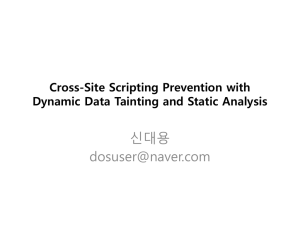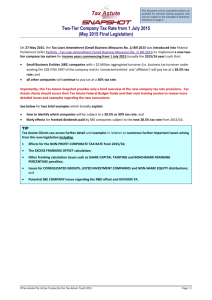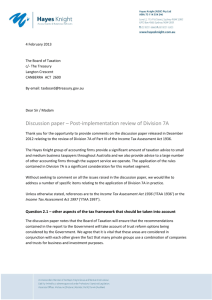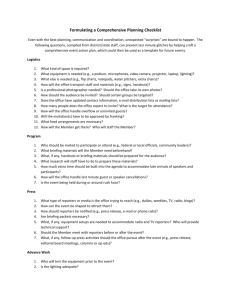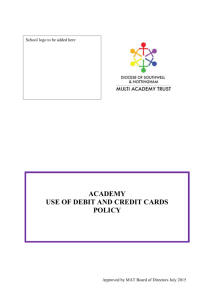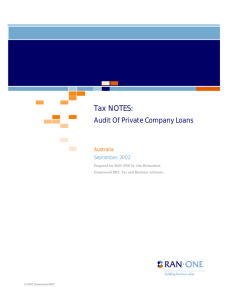0706 E Newsletter Corporate Tax.qxd
advertisement
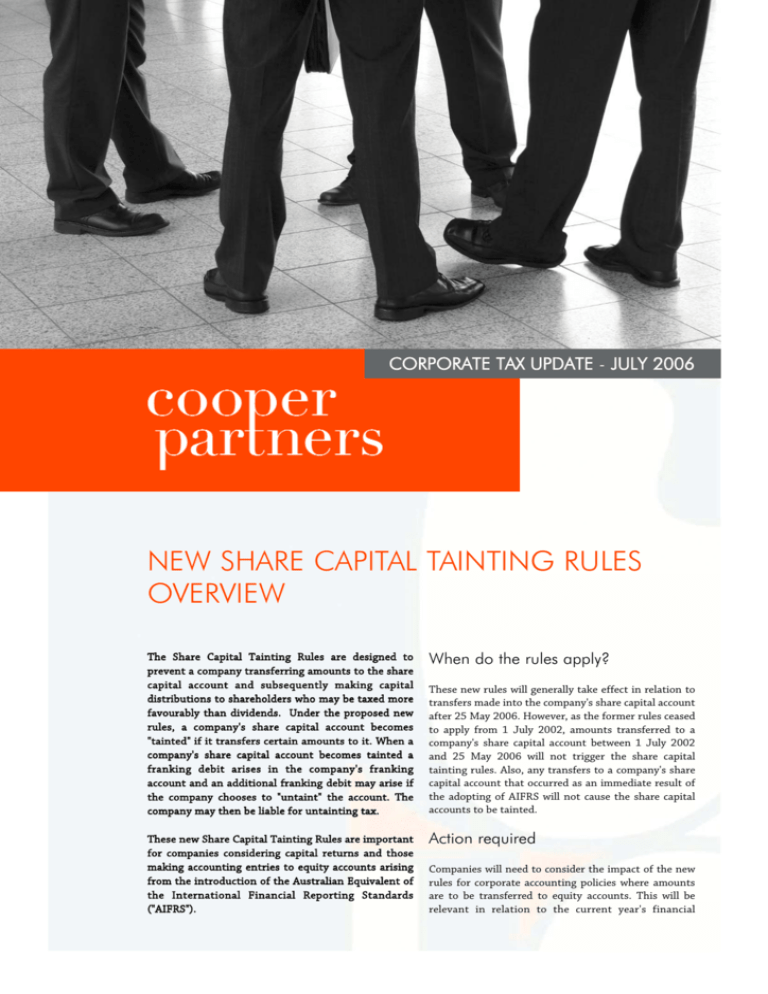
CORPORATE TAX UPDATE - JULY 2006 NEW SHARE CAPITAL TAINTING RULES OVERVIEW The Share Capital Tainting Rules are designed to prevent a company transferring amounts to the share capital account and subsequently making capital distributions to shareholders who may be taxed more favourably than dividends. Under the proposed new rules, a company's share capital account becomes "tainted" if it transfers certain amounts to it. When a company's share capital account becomes tainted a franking debit arises in the company's franking account and an additional franking debit may arise if the company chooses to "untaint" the account. The company may then be liable for untainting tax. These new Share Capital Tainting Rules are important for companies considering capital returns and those making accounting entries to equity accounts arising from the introduction of the Australian Equivalent of the International Financial Reporting Standards ("AIFRS"). When do the rules apply? These new rules will generally take effect in relation to transfers made into the company's share capital account after 25 May 2006. However, as the former rules ceased to apply from 1 July 2002, amounts transferred to a company's share capital account between 1 July 2002 and 25 May 2006 will not trigger the share capital tainting rules. Also, any transfers to a company's share capital account that occurred as an immediate result of the adopting of AIFRS will not cause the share capital accounts to be tainted. Action required Companies will need to consider the impact of the new rules for corporate accounting policies where amounts are to be transferred to equity accounts. This will be relevant in relation to the current year's financial statements which may involve significant transfers to equity accounts arising from the transition to AIFRS. There are transitional rules to enable the untainting of accounts that become tainted under the former rules which had not been untainted before 1 July 2002. Companies that will benefit from the retrospective adjustments to the former rules should consider applying for a refund of untainting tax paid and a reversal of franking debit entries. Points to Note 1. Timing of a franking debit the former rules. This will enable taxpayers to redress the adverse consequences of having previously tainted their share capital account. 3. Debt-equity swap For amounts transferred under a debt-equity swap arrangement, the new share capital tainting rules will not be triggered where the amount transferred does not exceed the market value of the debt being extinguished. If the amount transferred exceeds the market value of the extinguished debt, the share capital account is tainted only to the extent of an amount equal to the excess. A transfer of an amount to the company's share capital account will cause a franking debit to arise in the company's franking account at the end of the franking period in which the tainting occurs and not on the day of the transfer (this is a change to the former rules). The old rules would, prima facie, have applied to the whole of the transferred amount. However, the old share capital tainting rules have also been amended with effect from 1 July 1998 to ensure a similar outcome as the new rules. A company may therefore make a distribution before the end of the franking period in order to set the benchmark franking percentage for that period. That percentage will then apply to determine the amount of the franking debit that arises from the tainting. If no distribution is made by the end of the franking period, however, a default franking percentage of 100% will apply to determine the franking debit that arises from the tainting. 4. 2. Transfers from option premium reserves An additional exclusion under the new rules is that they will no longer apply to the transfer of an amount from an option premium reserve if the transfer is related to the exercise of options to acquire shares in the company. However, this exclusion will not apply if the transfer was made in the event the option lapsed without being exercised. We note that the former rules have been amended so that the additional exclusion will also apply for the purpose of Impact of new rules on consolidated groups The share capital tainting rules will have an impact on consolidated or Multiple Entry Consolidated groups. For instance, the transfer of an amount by a subsidiary member to its share capital account will only taint the subsidiary's account and not the share capital account of the head company. Franking debits arising at the time of the tainting and untainting will, however, arise in the franking account of the head company of the group. If a subsidiary member with a tainted share capital account joins another consolidated group, no further franking debits will arise in the franking account of the new group as a result of the above transfer to the subsidiary's share capital account. For further guidance or information on these new share tainting rules, please contact our office on 9261 7704. Level 3, 267 St George’s Terrace, Perth WA 6000 t 08 9261 7704 f 08 9261 7700 enquiries@cooperpartners.com.au www.cooperpartners.com.au This information is general advice only and neither purports, nor is intended to be advice on any particular matter. No responsibility can be accepted for those who act on the contents of this publication without first contacting us and obtaining specific advice.
